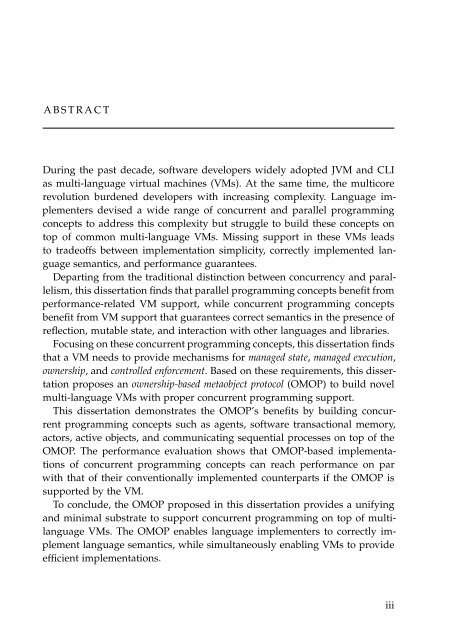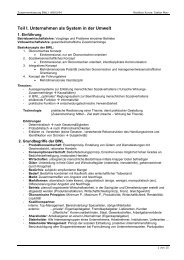- Page 1 and 2: Faculty of Science and Bio-Engineer
- Page 3: DON’T PANIC
- Page 9: A C K N O W L E D G M E N T S First
- Page 12 and 13: Contents 3.1.1.2. Survey Subjects .
- Page 14 and 15: Contents 6.5.2. Limitations . . . .
- Page 17: L I S T O F F I G U R E S 2.1. Mock
- Page 21 and 22: L I S T O F L I S T I N G S 2.1. Cl
- Page 23 and 24: 1 I N T R O D U C T I O N During re
- Page 25 and 26: 1.2. Problem Statement and garbage
- Page 27 and 28: 1.3. Research Goals 1.3. Research G
- Page 29 and 30: 1.4. Dissertation Outline programmi
- Page 31 and 32: 1.5. Supporting Publications and Te
- Page 33 and 34: 1.5. Supporting Publications and Te
- Page 35 and 36: 2 C O N T E X T A N D M O T I VAT I
- Page 37 and 38: 2.1. Multi-Language Virtual Machine
- Page 39 and 40: 2.2. The Multicore Revolution 2.2.
- Page 41 and 42: 2.3. Concurrent vs. Parallel Progra
- Page 43 and 44: 2.3. Concurrent vs. Parallel Progra
- Page 45 and 46: 2.4. Common Approaches to Concurren
- Page 47 and 48: 2.4. Common Approaches to Concurren
- Page 49 and 50: 2.4. Common Approaches to Concurren
- Page 51 and 52: 2.4. Common Approaches to Concurren
- Page 53 and 54: 2.4. Common Approaches to Concurren
- Page 55 and 56:
2.4. Common Approaches to Concurren
- Page 57 and 58:
2.4. Common Approaches to Concurren
- Page 59 and 60:
2.6. Summary reasoning when for ins
- Page 61 and 62:
3 W H I C H C O N C E P T S F O R C
- Page 63 and 64:
3.1. VM Support for Concurrent and
- Page 65 and 66:
3.1. VM Support for Concurrent and
- Page 67 and 68:
3.1. VM Support for Concurrent and
- Page 69 and 70:
3.1. VM Support for Concurrent and
- Page 71 and 72:
3.1. VM Support for Concurrent and
- Page 73 and 74:
3.1. VM Support for Concurrent and
- Page 75 and 76:
3.1. VM Support for Concurrent and
- Page 77 and 78:
3.1. VM Support for Concurrent and
- Page 79 and 80:
3.2. A Survey of Parallel and Concu
- Page 81 and 82:
3.2. A Survey of Parallel and Concu
- Page 83 and 84:
3.2. A Survey of Parallel and Concu
- Page 85 and 86:
3.2. A Survey of Parallel and Concu
- Page 87 and 88:
3.2. A Survey of Parallel and Concu
- Page 89 and 90:
3.2. A Survey of Parallel and Concu
- Page 91 and 92:
3.2. A Survey of Parallel and Concu
- Page 93 and 94:
3.3. Common Problems for the Implem
- Page 95 and 96:
3.3. Common Problems for the Implem
- Page 97 and 98:
3.3. Common Problems for the Implem
- Page 99 and 100:
3.3. Common Problems for the Implem
- Page 101 and 102:
3.3. Common Problems for the Implem
- Page 103 and 104:
3.3. Common Problems for the Implem
- Page 105 and 106:
3.4. Requirements for a Unifying Su
- Page 107 and 108:
3.4. Requirements for a Unifying Su
- Page 109:
3.5. Conclusions Proper support for
- Page 112 and 113:
4. Experimentation Platform 4.1. Re
- Page 114 and 115:
4. Experimentation Platform Classes
- Page 116 and 117:
4. Experimentation Platform these s
- Page 118 and 119:
4. Experimentation Platform for the
- Page 120 and 121:
4. Experimentation Platform 1 SOMIn
- Page 122 and 123:
4. Experimentation Platform 4.3. Sq
- Page 124 and 125:
4. Experimentation Platform Another
- Page 126 and 127:
4. Experimentation Platform Bytecod
- Page 128 and 129:
4. Experimentation Platform ensembl
- Page 130 and 131:
4. Experimentation Platform custom
- Page 132 and 133:
5. An Ownership-based MOP for Expre
- Page 134 and 135:
5. An Ownership-based MOP for Expre
- Page 136 and 137:
5. An Ownership-based MOP for Expre
- Page 138 and 139:
5. An Ownership-based MOP for Expre
- Page 140 and 141:
5. An Ownership-based MOP for Expre
- Page 142 and 143:
5. An Ownership-based MOP for Expre
- Page 144 and 145:
5. An Ownership-based MOP for Expre
- Page 146 and 147:
5. An Ownership-based MOP for Expre
- Page 148 and 149:
5. An Ownership-based MOP for Expre
- Page 150 and 151:
5. An Ownership-based MOP for Expre
- Page 152 and 153:
5. An Ownership-based MOP for Expre
- Page 154 and 155:
5. An Ownership-based MOP for Expre
- Page 156 and 157:
5. An Ownership-based MOP for Expre
- Page 159 and 160:
6 E VA L U AT I O N : T H E O M O P
- Page 161 and 162:
6.1. Evaluation Criteria Concurrent
- Page 163 and 164:
6.2. Case Studies concepts has prac
- Page 165 and 166:
6.2. Case Studies Table 6.2.: Requi
- Page 167 and 168:
6.2. Case Studies Ad Hoc Solutions
- Page 169 and 170:
6.2. Case Studies Immutability In a
- Page 171 and 172:
6.2. Case Studies Important for thi
- Page 173 and 174:
6.2. Case Studies The primitives re
- Page 175 and 176:
6.2. Case Studies 1 WriteStream = S
- Page 177 and 178:
6.2. Case Studies ing actor. Upon c
- Page 179 and 180:
6.2. Case Studies vide additional p
- Page 181 and 182:
6.3. Supported Concepts Table 6.3.:
- Page 183 and 184:
6.4. Comparing Implementation Size
- Page 185 and 186:
6.4. Comparing Implementation Size
- Page 187 and 188:
6.4. Comparing Implementation Size
- Page 189 and 190:
6.4. Comparing Implementation Size
- Page 191 and 192:
6.5. Discussion Table 6.6.: Metrics
- Page 193 and 194:
6.5. Discussion Vats, as prosed by
- Page 195 and 196:
6.5. Discussion Based on these obse
- Page 197 and 198:
6.5. Discussion Method Invocation R
- Page 199 and 200:
6.5. Discussion Limited support for
- Page 201:
6.6. Conclusion can be varied as de
- Page 204 and 205:
7. Implementation Approaches 7.1. A
- Page 206 and 207:
7. Implementation Approaches The me
- Page 208 and 209:
7. Implementation Approaches code c
- Page 210 and 211:
7. Implementation Approaches port f
- Page 212 and 213:
7. Implementation Approaches bility
- Page 214 and 215:
7. Implementation Approaches The mo
- Page 216 and 217:
7. Implementation Approaches Custom
- Page 218 and 219:
7. Implementation Approaches method
- Page 220 and 221:
7. Implementation Approaches introd
- Page 223 and 224:
8 E VA L U AT I O N : P E R F O R M
- Page 225 and 226:
8.1. Evaluation Strategy The RoarVM
- Page 227 and 228:
8.1. Evaluation Strategy posed eval
- Page 229 and 230:
8.2. Methodology Generalizability b
- Page 231 and 232:
8.3. Baseline Assessment marking fr
- Page 233 and 234:
8.3. Baseline Assessment 3500 3000
- Page 235 and 236:
8.3. Baseline Assessment the OMOP i
- Page 237 and 238:
8.4. Ad hoc vs. OMOP Performance Ta
- Page 239 and 240:
8.4. Ad hoc vs. OMOP Performance 10
- Page 241 and 242:
8.5. Assessment of Performance Char
- Page 243 and 244:
8.5. Assessment of Performance Char
- Page 245 and 246:
8.5. Assessment of Performance Char
- Page 247 and 248:
8.5. Assessment of Performance Char
- Page 249 and 250:
8.6. Absolute Performance To conclu
- Page 251 and 252:
8.7. Discussion and Threats to Vali
- Page 253 and 254:
8.7. Discussion and Threats to Vali
- Page 255 and 256:
8.8. Conclusions Important to note
- Page 257 and 258:
9 C O N C L U S I O N A N D F U T U
- Page 259 and 260:
9.2. Contributions the identified r
- Page 261 and 262:
9.3. Limitations OMOP addresses com
- Page 263 and 264:
9.4. Overall Conclusions The limita
- Page 265 and 266:
9.5. Future Work 9.5.1. Support for
- Page 267 and 268:
9.5. Future Work 9.5.4. Representat
- Page 269:
9.6. Closing Statement bytecode dis
- Page 272 and 273:
Appendix A. Appendix: Survey Materi
- Page 274 and 275:
Appendix A. Appendix: Survey Materi
- Page 276 and 277:
Appendix A. Appendix: Survey Materi
- Page 278 and 279:
Appendix A. Appendix: Survey Materi
- Page 280 and 281:
Appendix A. Appendix: Survey Materi
- Page 282 and 283:
Appendix A. Appendix: Survey Materi
- Page 284 and 285:
Appendix B. Appendix: Performance E
- Page 286 and 287:
Appendix B. Appendix: Performance E
- Page 288 and 289:
Appendix B. Appendix: Performance E
- Page 290 and 291:
Appendix B. Appendix: Performance E
- Page 293 and 294:
R E F E R E N C E S Martín Abadi a
- Page 295 and 296:
References Stephen M. Blackburn, Ro
- Page 297 and 298:
References OOPSLA ’05: Proceeding
- Page 299 and 300:
References Transactions on Software
- Page 301 and 302:
References Gopal Gupta, Enrico Pont
- Page 303 and 304:
References ’04, pages 26-35, New
- Page 305 and 306:
References Gregor Kiczales, John La
- Page 307 and 308:
References Stefan Marr and Theo D
- Page 309 and 310:
References S. E. Mitchell, A. Burns
- Page 311 and 312:
References Lukas Renggli and Oscar
- Page 313 and 314:
References and Phd Forum (IPDPSW),
- Page 315 and 316:
References David Ungar. Everything
- Page 317 and 318:
References Peter H. Welch, Neil Bro





